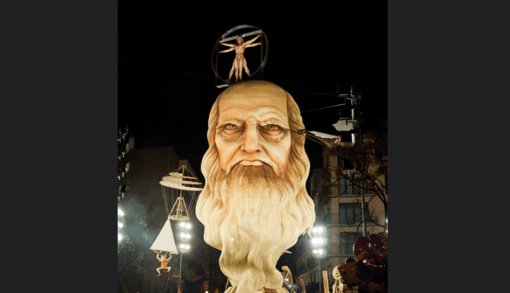
Photo by anpalacios | Public Domain
Last month was the hundredth anniversary of the October Revolution, the first successful revolution against capitalism, opposing the imperialist blood-bath of WW1, which killed 18 million. The October Revolution was important, also, because it opened new ways of thinking, more realistic ways.
Lenin died too soon. He was a philosopher. [i] Revolution requires intellectual innovation at every level. Marx was innovatively philosophical. [ii] This is not much noted. It is missed by many academic Marxists. The philosophical is harder than the political and economic.
It can affect how you see yourself, and how you think.
The October Revolution showed the importance of science. I do not mean the launching of Sputnik. I mean the importance of science for understanding the human condition, for understanding how human beings live, and how we might live, better.
Leonardo da Vinci knew this role. He gets no credit for the radical import, or potentially radical import, of his view of who we are, as human beings. In the fifteenth century, he was a vegetarian. He paid for birds in the marketplace and then set them free. He thought human beings are part of nature, and best understood through nature, which he respected and studied intensively.
Leonardo da Vinci was a scientist. He articulated a mechanistic view of the universe two hundred years before Newton. He was likely the first to describe human beings’ dental constitution, and he knew geology. Observing birds incessantly, he overturned Aristotle’s theory that birds are supported by air as fish are by water. He dissected bodies, identifying anatomy previously unknown.
He was, first and foremost, though, a painter. Biographers say da Vinci’s obsessive questions – what does the tongue of a woodpecker look like? – express curiosity we should all emulate. They make cliché statements about Leonardo’s “childlike wonder”.
But we ask questions for a reason, and Leonardo da Vinci wondered about mind/body connection. We love his portraits – Mona Lisa, Lady with an Ermine – because they show the intricate workings of minds. Connecting mind and body was a key component of his artistic genius.[iii]
But a few hundred years later, European philosophers denied that connection. They drew a distinction between facts about how the world is – science – and facts about how it ought to be – ethics. The so-called “fact/value” distinction undermined ethics. Across Canada, ethicists and political philosophers do not discuss the nature of reality, or how to know it. They leave this for philosophers of science.
They think questions about value do not require science. They do not require truth of any sort.
The Buddha, 2500 years ago, had no truck with the “fact/value distinction”. It wouldn’t have occurred to him. Precisely to the degree that I know the physical reality of the universe, experientially, through feelings, I start to know how to live.
And precisely to the degree that I live morally, by which he meant acting out of good will toward others, I understand reality. The two are inseparable. It has to do with mind/body connection. The one affects the other. It was obvious to Leonardo da Vinci.
It took European philosophers to come up with the idea that questions about value are separate from questions about truth.
Marx thought differently. So did Lenin, and Antonio Gramsci, and José Martí. They knew, for one thing, how capitalism makes human beings, or some, unknowable. It is not a moral thing. It is factual. Morality, if we believe in it, surely requires knowing human beings.
Lenin described knowledge as a “passage through dark waters”. If your very own thinking presupposes the “objective world”, which it does because of causation, you have to lose your attachment to that thinking in order to learn what lies beyond it: the world as it is.
Lenin’s passage through dark waters, by itself, opened new ways of thinking. It was so in South America. José Ingenieros, brilliant Argentinean psychiatrist who turned his copious talents to anti-imperialism after the First World War, led a movement for educational reform, across the continent.
He also died too soon. Ingenieros saw that the entire educational system had brought South America to the feet of the imperialists. [iv] He singled out the hypocrisy of philosophers, engaged in intellectual game-playing when they could have led the way toward deeper understanding of the human condition.
They could have explained how we know, and why it matters – for ethics and political philosophy – that we know how we know. Fidel Castro said in 1999, “They discovered smart bombs. We discovered that people think and feel.” Cubans discovered, or rediscovered, the ancient truth that human beings know the world dialectically. We know, not just intellectually, but by feeling the effects of the world, bodily.
We should take seriously Leonardo da Vinci’s commitment to science on behalf of art, and beauty: human beauty.
His commitment to science needs to be understood more deeply than through naive clichés about supposedly childlike wonder. The clichés themselves indicate how little we know about how we know.
Lenin did not ignore such questions. Martí, who was an anti-imperialist decades before Lenin, made such questions – philosophical though they are – central to his revolutionary program.
He was a realist. Lenin was also. Lenin should be remembered, now, as a philosopher.
Ana Belén Montes should be remembered.[v] She pursued truth, and acted upon it. She is in jail, in the US, having hurt no one. Please sign petition here.
Notes.
[i] Tamas Krausz, Reconstructing Lenin: An Intellectual Biography (Monthly Review Press); Lar T. Lih, Lenin: Critical lives ( UK: Reaktion Books, 2011)
[ii] Allen Wood, Karl Marx: Second Edition (Routledge 2003)
[iii] Walter Isaacson Leonardo da Vinci (Simon and Schuster, 2017) 219
[iv] In Raúl Roa, Bufa subversiva (Havana: Ediciones la memoria, 2006) 35
[v] http://www.prolibertad.org/ana-belen-montes. For more information, write to the cnc@canadiannetworkoncuba.ca or cincoheroes@listas.cujae.edu.cu